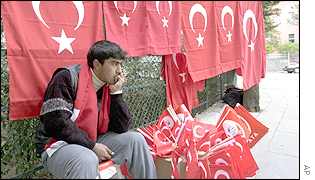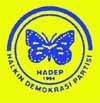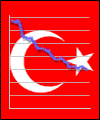18
October 2002
![]()
2. "UK advocates EU reward for Turkey", Britain has urged the European Union to reward Turkey for political reforms, suggesting that moves should be made towards giving Ankara a date for accession.
3. "Kurdish broadcasts in Turkey subject to a thousand and one restrictions", the draft “Directive Regarding Broadcast Languages” on which the Turkish Supreme Board for Radio and Television (RTUK) has been working calls for prison sentences of from 3.5 to 14 years and monetary fines of up to 120 billion Turkish liras for the owners and managers of broadcasting facilities that broadcast without permission in languages other than Turkish.
4. "Turkish singer charged in balloon incident", national flag appeared on television show balloons.
5. "DEHAP will carry its voters from Europe to Turkey", the Federation of Kurdish Associations in Germany (YEM-KOM) which is a very close organization to the pro-Kurdish parties such as the People's Democracy Party (HADEP) and Democratic People Party (DEHAP) is making a organization to carry Kurdish voters from European countries to Turkey to assure them to vote for pro-Kurdish DEHAP in the election boxes at the customs.
6. "Crisis-hit Turkey drafts tight budget for 2003", Turkey unveiled on Friday a draft budget for 2003, allocating almost half of the spending to debt repayments. The draft, which has been submitted to the outgoing parliament even though it is in recess, could be amended by the new government that will take office after early general elections on November 3.
1. - Reuters - "Opinion polls shed murky light on Turkish election":
A sample of nine polls reported in Turkish newspapers since mid-August, including the two editions of the Deutsche Bank poll, shows support for the main parties shifting widely.
ANKARA / 18 October 2002
Turkey's November election will be crucial for the European Union
hopeful but predicting the result is a hazardous affair when opinion
polls are notoriously unreliable and some are dismissed as deliberately
misleading.
Recent polls show a lead for a party disdained by the powerful army as Islamist and growing support for a populist anti-IMF party. But a nervous establishment can perhaps draw solace from the fact the pollsters got it entirely wrong in 1999 when nationalists crept up undetected to win nearly 20 percent.
A major foreign bank that planned to publish monthly opinion polls in the four months leading up to the election changed its mind after the first two polls sparked furious charges of meddling in Turkish politics.
Opinion polls are a touchy subject in Turkey, a EU candidate country often hailed by its ally the United States as a shining example of a Muslim democracy. The result of the election is being watched by allies and potential investors.
"Polls taken before past elections have tended to vary substantially from each other, and have often been criticised as misleading attempts to boost the images and chances of specific parties," Deutsche Bank said in August when it launched its poll as an "independent assessment" of voters' intentions.
Turkish politicians cried foul, accusing the bank of trying to manipulate the outcome. There seemed little understanding for the notion that investors sought nothing more sinister than to anticipate what government they might face on November 4.
"Polls carried out for political motives should not be published," said an angry Ufuk Soylemez, deputy chairman of the opposition True Path Party (DYP).
He said the aim of the Deutsche Bank poll was to draw votes from other rightist parties towards the Justice and Development Party (AKP), whose leader Recep Tayyip Erdogan has been banned from the election because of a conviction for Islamist sedition.
Deutsche Bank published the poll twice based on surveys carried out on July 27-29 and August 24-26. The AKP topped the poll both times, with support rising from 19 percent to 24.6 percent between the two surveys.
Investors are generally wary of the AKP, fearing it may not stick rigidly to Turkey's $16 billion International Monetary Fund rescue programme. Erdogan has said he will continue working with the IMF but party officials have talked of minor refinements to the programme.
Deutsche Bank declined to comment on why its opinion poll was no longer being published.
The August poll by Deutsche Bank showed only one other party likely to pass the 10 percent barrier needed to win seats in parliament at the November 3 election. It gave second place to the Republican People's Party (CHP) with 14.3 percent, followed by True Path with 8.8 percent.
Former Foreign Minister Ismail Cem, whose New Turkey Party (YTP) saw support dip to four percent from 7.5 percent between the two editions of the poll, also lashed out at polls by "foreign holdings" whom he accused of "colonialism".
"The aim of these surveys is to mess with people's minds and interfere with the vote," Cem said. "Turkey is nobody's colony."
Bad record for polls
Opinion polls failed to predict the result of the last election in 1999 which was won by Prime Minister Bulent Ecevit's Democratic Left Party (DSP). The big surprise was the success of the Nationalist Action Party (MHP), a far right party that had made little impact in previous polls but which joined a coalition with Ecevit and the conservative Motherland Party.
Cem has compared this year's election on November 3 to "Russian roulette" and with polls putting the number of undecided voters at between 10 and 25 percent, there's room for big changes.
Sami Kohen, a columnist at the daily Milliyet, said the result would be affected by tactical voting. Many who might be inclined to vote for parties that appear below to be the 10 percent threshold may switch at the last minute so as not to waste their vote.
"There's a volatile mass of votes that may only at the last minute attach to a certain party," Kohen said. Opinion polls will be influential in people's decisions on who to vote for.
Another strong factor is the lack of the loyalty to parties that marks many western European countries. Today's mainstream parties arose from the political wreckage left by a 1980 army coup and three years of military rule. They inspire little sense of history or tradition. Add to this popular cynicism over economic crisis and corruption and the picture looks highly volatile.
A sample of nine polls reported in Turkish newspapers since mid-August, including the two editions of the Deutsche Bank poll, shows support for the main parties shifting widely.
While AKP is always ahead, its lead over the CHP varies from around four to 15 percentage points. CHP has seen its support rise since Kemal Dervis, architect of Turkey's IMF pact and seen by financial markets as a guarantor of stability in the crisis-hit country, joined it.
Also on the rise is the Youth Party (GP), a brand new party founded by businessman Cem Uzan in July. Early polls saw GP well below the 10 percent threshold but after the most energetic campaign of all the parties, it may now be close to 10 percent.
A recent survey by respected pollster Tarhan Erdem published in Radikal newspaper this month showed support for GP at 10-13 percent. It put AKP at 30-34 percent and CHP at 17-21 percent.
Other parties, including Ecevit's DSP and his two coalition partners MHP and Motherland, were seen below six percent.
Turkey has strict rules governing the publication of opinion polls in an attempt to avoid manipulation of the voters through deliberately misleading polls. All polls are banned in the final week before the vote. The election board and media watchdog can shut down newspapers and broadcasters for biased coverage.
Broadcasting authorities recently ordered Uzan's Star
TV to shut down its three channels for six days. ![]()
2. - The Financial Times - "UK advocates EU reward for Turkey":
18 October 2002 / by Christopher Adams
Britain has urged the European Union to reward Turkey for political
reforms, suggesting that moves should be made towards giving Ankara
a date for accession.
Jack Straw, foreign secretary, said yesterday that Turkey's accession to the EU would benefit Britain and the rest of Europe, as western governments pursue a war on terror.
"Turkey is a key member of Nato and a vital ally in the campaign against terrorism," Mr Straw told the German-British Forum in London. It had made "significant progress" towards meeting the necessary political criteria for starting negotiations.
Britain has long been in favour of Turkey becoming an EU member. Mr Straw's remarks accord with Washington's awareness that Turkey will be an important ally in possible military action against Iraq. The US, which already uses a Turkish base to patrol a "no-fly" zone in northern Iraq, is likely to want more co-operation.
Mr Straw's comments also come before crunch negotiations on the internal future of Cyprus, and the year-end completion of talks for it to join the EU in 2004.
The long-standing dispute between Greek and Turkish Cypriots has not been settled, despite efforts this year. The EU would like the dispute resolved before negotiations on Cyprus' accession are completed, but with Turkey in political and economic turmoil a deal seems increasingly unlikely.
The US is pressuring Brussels to be more flexible with Ankara. Last week the EU said Cyprus would be included and left Turkey's status unclear, a decision that disappointed Ankara. It praised Turkey's reforms, including the abolition of the death penalty, but was not ready to open talks.
Turkey's desire to join the EU and the progress it had
made required "reciprocal signals" from Brussels, Mr Straw
said. Greece has also backed Turkey's accession. ![]()
3. - Ozgur Politika - "Kurdish broadcasts in Turkey subject to a thousand and one restrictions":
17 October 2002
The draft “Directive Regarding Broadcast Languages” on which the Turkish Supreme Board for Radio and Television (RTUK) has been working calls for prison sentences of from 3.5 to 14 years and monetary fines of up to 120 billion Turkish liras for the owners and managers of broadcasting facilities that broadcast without permission in languages other than Turkish.
The draft, which states that instruction in Kurdish may not be included in any form, does not require that permission be obtained for the broadcast of songs in Kurdish.
According to the draft, being put into its final form by the RTUK, which is considering alternatives on certain articles in line with the views of the General Secretariat for the EU, “broadcasts in languages and dialects traditionally used by the people in their daily lives” will be possible, but no instruction in these will be permitted.
In this context, broadcast institutions will be able to apply to the RTUK to broadcast in only one such language or dialect. The RTUK has not yet decided as to whether these broadcasts will be local, regional, or nationwide. In addition, according to the draft, television stations will be able to broadcast in languages like Kurdish for no more than two hours per week, while radio stations will be able to broadcast a total of six hours on two days within a week, with one of these days being on a weekend. While Kurdish is being broadcast on television, “an exact translation, identical in both content and time duration”, must be displayed in Turkish subtitles, while radio stations will broadcast a Turkish translation immediately following the Kurdish program.
The RTUK will “seek information and documentation from the relevant official bodies” regarding those who apply to broadcast, and will grant permission to those whom it deems suitable. Applications must be accompanied by a notarized document promising that the applicant will adhere to all provisions of the law. The draft directive also contains heavy penalties in the event of its conditions being violated.
If broadcasting organizations which receive permission from the RTUK to broadcast in a language other than Turkish violate the conditions of the directive, an ascending scale of ever more onerous penalties will be applied. According to these, organizations that violate their responsibilities will be punishedin accord with article 33 of the RTUK Law.
According to this article, various warnings and monetary fines will be applied regarding those who contravene the broadcast principles, as is the case with Turkish broadcasts as well, and both temporary and permanent suspension of their broadcasts will be applied as well. In addition, the broadcast equipment of such organizations will be seized by the state.
TRT didn’t want Kurdish
Meanwhile, while the RTUK has been continuing its preparations on a directive for Kurdish broadcasts, it has also speeded up work regarding whether or not such broadcasts will be nationwide or regional, and whether they will be carried out by TRT [official Turkish Radio and Television].
A meeting was held on this topic the day before yesterday.
Officials from the RTUK stated that broadcasts in the native language
could be made on one of the regional or nationwide television stations,
but TRT officials, giving a negative report regarding broadcasts in
the native language, said that “We cannot do ![]()
4. - AP - "Turkish singer charged in balloon incident":
National flag appeared on television show balloons
ISTANBUL / 17 October 2002
A court began trying one of Turkey's most popular singers Thursday on charges she insulted the Turkish flag by kicking balloons emblazoned with its image, a local news agency reported.
Prosecutors have demanded up to six months in prison for Hulya Avsar, a popular singer and actress, after she kicked several red balloons that were in her way as she walked to meet guests on her TV show earlier this year, the Anatolia news agency reported.
The balloons -- depicting the crescent and star of the Turkish flag -- were used as decoration by the private Show TV station. It aired the Avsar program in April to support the Turkish soccer team, which was participating in the World Cup for the first time since 1954.
Under Turkish laws, the flag may not be depicted on objects and must never touch the ground.
Avsar's lawyer, Osman Hacibekiroglu told the court his client was not aware that balloons with Turkish flags were being used as decoration. Avsar did not attend the hearing.
The program's producer, an assistant, and the suppliers
of the balloons were also charged, and all face six months in prison
if convicted. ![]()
5. - Turkish Daily News - "DEHAP will carry its voters from Europe to Turkey":
ANKARA / 18 October 2002
The Federation of Kurdish Associations in Germany (YEM-KOM) which
is a very close organization to the pro-Kurdish parties such as the
People's Democracy Party (HADEP) and Democratic People Party (DEHAP)
is making a organization to carry Kurdish voters from European countries
to Turkey to assure them to vote for pro-Kurdish DEHAP in the election
boxes at the customs.
The High Election Board on Tuesday ruled against Chief Prosecutor Sabih Kanadoglu's petition to strike DEHAP from the ballot for allegedly not fulfilling technical criteria.
According to a news article reported by pro-Kurdish daily newspaper, Ozgur Politika, YEM-KOM will carry DEHAP voters by planes from Europe to Turkey beginning from October 20.
According to information given by YEM-KOM officials to
the newspaper, numerous planes will depart to carry Kurdish voters to
Turkey. Stating that many of the Kurdish voters have gone to Turkey
to use their vote during the semester holiday in Germany, the officials
said that the first plane will depart from Stuttgart on October 20,
and another eight planes will follow this flight on October 26 from
Hamburg, Dusseldorf, Frankfurt, Paris, Amsterdam, Stockholm and Zurich.
![]()
6. - AFP - "Crisis-hit Turkey drafts tight budget for 2003":
ANKARA / 18 October 2002
Turkey unveiled on Friday a draft budget for 2003, allocating almost
half of the spending to debt repayments. The draft, which has been submitted
to the outgoing parliament even though it is in recess, could be amended
by the new government that will take office after early general elections
on November 3.
Finance Minister Sumer Oral told a press conference that the draft, based on projections of five-percent economic growth and 20-percent inflation, was in line with a tight economic reform program backed by IMF loans of up to 16 billion dollars.
The draft foresees revenues totalling 96.4 thousand trillion liras (58.2 billion dollars) and allows for expenditures of 143.2 thousand trillion liras. The budget deficit is envisaged at 46.8 thousand trillion liras (28.2 billion dollars).
Oral said 66.4 thousand trillion lira (40.1 billion dollars)
of the spending would go to interest payments of Turkey's domestic debt
stock, which -- according to treasury figures -- stood at about 137
billion dollars in August. Turkey has been battling severe financial
woes since 2001, when the economy contracted by 9.4 percent and the
Turkish lira lost almost half of its value against the dollar. The economy
is expected to grow about four percent this year and inflation, which
hit 68.5 percent in 2001, is expected to decrease to around 35 percent.
![]()